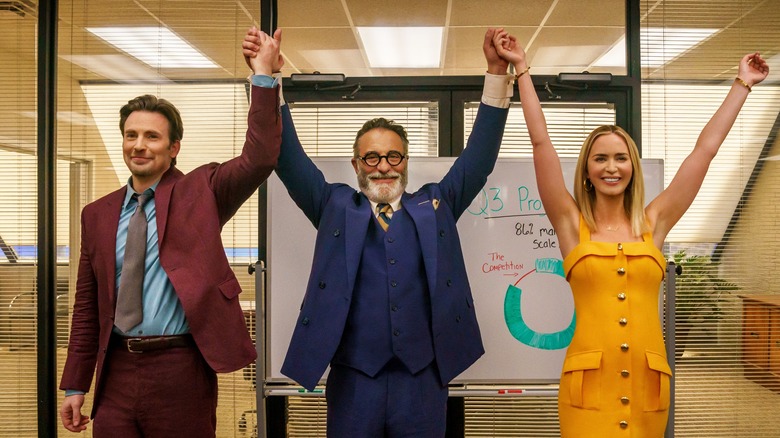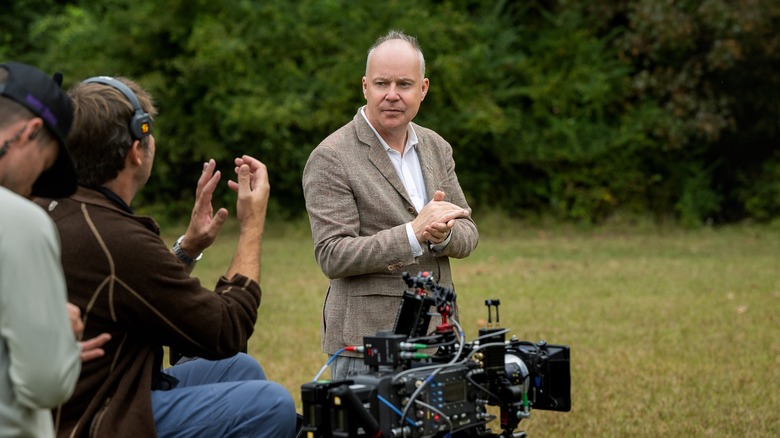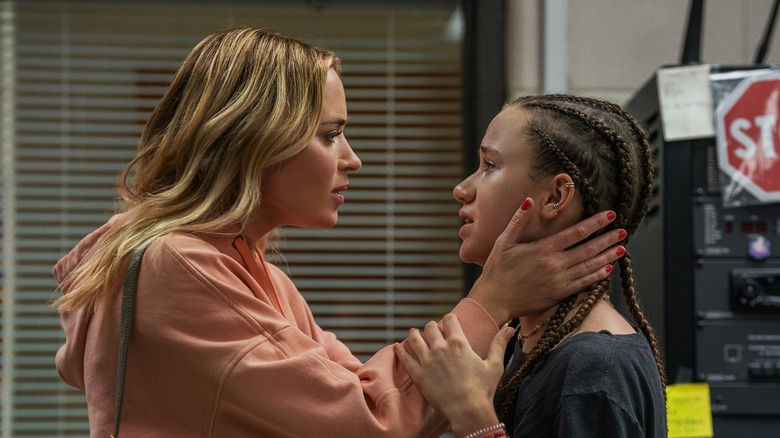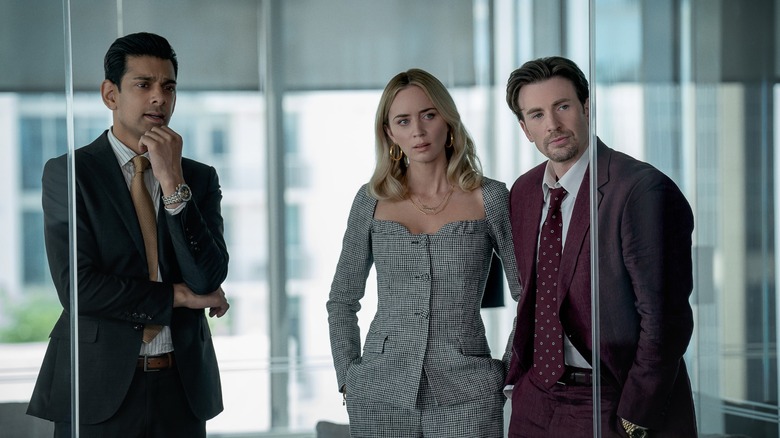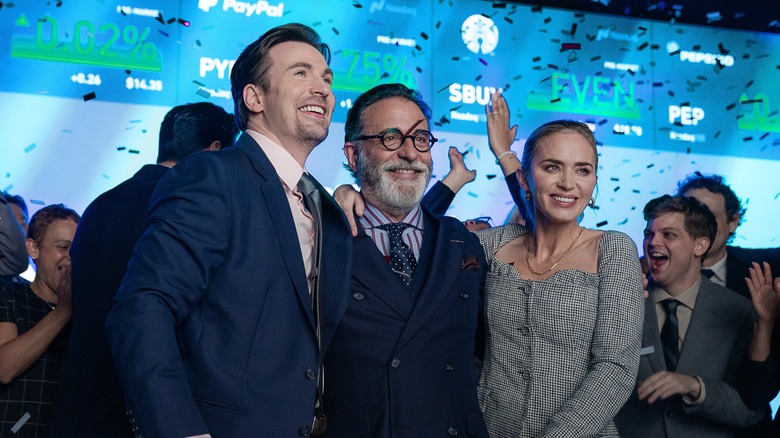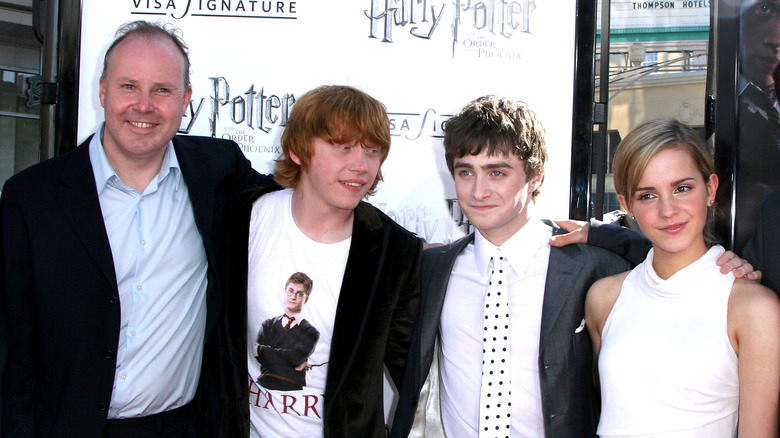Harry Potter Director David Yates Leaves Fantasy Behind For Brutal Reality Of Pain Hustlers - Exclusive Interview
In 2007, David Yates entered J.K. Rowling's Wizarding World with "Harry Potter and the Order of the Phoenix," marking the director's first film in the author's sprawling, blockbuster book-turned-movie series. But after three more "Harry Potter" films and three prequel tales with the "Fantastic Beasts" movies from 2016 to 2022, Yates decided that it was time to vacate the fantasy realm for a relatable human tale that was decidedly more hard-hitting in nature.
The riveting result is "Pain Hustlers," Yates' searing, fact-based opioid drama about how a small group of scheming salespeople transformed a small pharmaceutical company teetering on the edge of bankruptcy into an industry powerhouse — through unethical practices like influencing doctors to sell their addictive, fentanyl-infused pain medication.
Playing in limited release in theaters and streaming exclusively on Netflix on October 27, "Pain Hustlers" is based on reporter Evan Hughes' 2022 best-selling book "The Hard Sell: Crime and Punishment at an Opioid Startup," which chronicles the rise of fall of the pharma company Insys Therapeutics. Emily Blunt stars in "Pain Hustlers" as Liza Drake, a struggling single mother of Phoebe (Chloe Coleman), a young teen afflicted with a serious medical condition. Liza's fortunes change, though, when she meets Pete Brenner (Chris Evans), a slick sales executive who offers her a chance to make big money at Zanna, a flailing startup pharmaceutical company owned by the eccentric Dr. Jack Neel (Andy Garcia). Desperate to get out of her hopeless situation, Liza quickly learns the dirty little secrets of the pharmaceutical sales industry, including the infamous tactic of "speaker programs" — a "legal grift," Pete explains to her — where sales reps grease doctors with cash and other benefits if they start prescribing their company's drugs.
Yates discussed his passion behind telling the story of "Pain Hustlers" with Looper in an exclusive interview.
A news article sparked Yates' passion to make Pain Hustlers
Talking about getting far away from the wizarding world of "Harry Potter" and "Fantastic Beasts" ... "Pain Hustlers" and its decidedly different story — which is obviously grounded in real human issues — is that something you were looking for, or was it by mere happenstance that this project landed on your radar?
I read an article in The New York Times Magazine that blew me away. It was written by Evan Hughes, a very fine journalist, and it told the story of Insys, this small pharma company that had done extraordinarily well in the pharma sector. Evan's account of this company's rise and fall was absolutely fascinating. I was looking for a story that took me back to the real world rather than the Wizarding World, and the American landscape of sales reps in these small pharma companies intrigued me. Telling their story seemed like a real change of course for me, so it was a very appealing thing to dive into.
Evan's original article, and then his book, meticulously documented this company. I come from a healthcare system in Europe that is defined around the patient and the patient's care, and what struck me about this story was everything was geared around making a fast buck — it was not really about the care of the patients. I was intrigued, and I wanted to explore that further. We joined forces with Grey Matter, Lawrence Grey's Company. He's an American producer — very nice man — and between us, over the course of two [or] three years, we developed a screenplay.
The system is to blame in pharma schemes, not individuals, Yates says
As a filmmaker you want to first and foremost entertain, but man, you bring the hammer down hard on the pharmaceutical companies with "Pain Hustlers." Is it exhilarating in a way because it gives you a chance of exacting justice? In the particular case of "Pain Hustlers," justice is served — although some may argue not nearly enough — and some of these pharmaceutical companies get away scot-free.
The thing ultimately is that it's the system itself that allows either the lenient rules or the rules that can be ... There's a line in the movie that we echo a few times [about driving] "67 in a 65." With 67 in a 65, you can fudge the rules a little bit; you know how to get around them. Really, it's about any system. It always requires careful policing to make sure that the greed and the ambition of people don't start to compromise the safety of people. That's ultimately it.
I don't really blame the individuals involved. Our characters are inspired by real-world human beings; we invented a few things to tell our story for a broad, universal audience. Ultimately, we didn't want to create villains or monsters ... Liza Drake, who's our heroine — she's ambitious. She's a little bit naive; she's idealistic. She wants to do the best for her kid. At the same time, she gets sucked into this extraordinarily addictive mission to be successful and to hit certain goals and to make a good life.
Then, she ends up going in this moral maze on the course of her journey and realizes that she's done something terribly wrong by the end of it, and she has to stand up and take accountability ... Even Dr. Lydell, who is this character who over-prescribes to earn lots of money — we didn't even want to define him as a villain. He's a lost, broken, lonely guy who's going through a difficult divorce, looking for someone who understands him. He's vulnerable to those sales practices [and] is vulnerable to being persuaded and manipulated to write more drugs. Even in Brian d'Arcy James' portrayal of Dr. Lydell, you don't see a monster. You see someone who's almost being taken advantage of.
Yates says Evans' 'natural charisma' helps him pull off his 'sleazeball' role
You say there are no real villains in "Pain Hustlers," although Chris Evans' character, Pete Brenner ... He's pretty despicable. But the amazing thing is, you're still engaged by him as an audience member, although his behavior is abhorrent. That must have been an enormously difficult thing to balance for both you and Chris, and it's pretty impressive, the way you find that balance.
The thing about Chris' portrayal of Pete Brenner is he relished that opportunity to flex those kinds of sleazy muscles in pursuit of a character who's, on one level, incredibly unpleasant — but on another, you can't help but feel for him. All his relationships are transactional. There's a lovely scene Chris plays with Emily [Blunt] on a balcony, and the lines that [screenwriter] Wells [Tower] wrote were so poignant in a way when he says, "We finally got there. We won."
He represents this group of people who have always been undervalued [and] underappreciated, and he's had to fight. He's had to take this course he's taken because it's tough in that business he's in. You weirdly [embrace him], and Chris has so much natural charisma, so he can get away with being sleazeball and yet still keep us with him. That is all down to Chris' ability to find — even in that human being that he's betraying — a bit of humanity.
Yates says the humor sets up the entrance of a Trojan horse in Pain Hustlers
Aside from Chris Evans' Pete Brenner, there's Emily Blunt's character, Liza Drake. She's in the middle of this mess and realizes all the terrible things that are going on around her, yet she remains the moral center. That's a difficult thing to pull off as well.
We always felt the movie was a bit of a tightrope walk because there were other stories in this space that were being made at the same time as us, but from the very first moment we started to develop the screenplay, we wanted to take a slightly more subversive approach with the material. We wanted to bring the story to as many people as possible.
You do that by making it broadly entertaining. You find the humor as well as the humanity in the story. We set out to make something that was propulsive and engaging and entertaining, in the hope that it brings an audience that then is left with this very important message at the end of the movie.
That was a Trojan horse way of telling a story, and it was important to us that [we told it that way] ... We've sat with big audiences watching the movie, and we know it plays and it entertains people — and we know [by] the way the room settles towards the final third of the movie, the message is also landing. That was our approach.
Yates is thrilled with Robbie's career trajectory after directing her in The Legend of Tarzan
I have to tell you, David, I thought your film "The Legend of Tarzan" was terrific, and it included a cast member whose star was on a meteoric rise with Margot Robbie. Do you recall any specific moments when you were filming where you realized audiences "haven't seen nothing yet" from Margot?
Margot was always amazingly thoughtful, bright, and insightful, and it doesn't surprise me. What is particularly marvelous about what Margot's doing is she's empowering and finding stories [that] she supports, and she gets made, which need to be heard. When you get to a certain point as a star, you have a lot of influence, and you have a lot of power.
I really respect and admire the way she's leveraging that influence to bring stories to the screen that matter and are interesting and might not otherwise get brought to the screen. That's a terrific use of that, of what she's achieving ... She's always had that amazing star power, and she was always completely watchable on screen. I admire the fact that she's leveraging that success now to make other stories happen with other filmmakers and other directors. It's wonderful.
Yates applauds Radcliffe's career choices post-Harry Potter
I know that you say "never say never" when it comes to you and future "Harry Potter" franchise projects, but I certainly hope you work with Daniel Radcliffe again because man, that guy's got it all going. He's gone off into a direction audiences never expected.
Yes, Dan is fearless, and I've admired what he's been doing. He'll dive into any number of different roles to redefine himself. It's admirable that he keeps trucking, and he's done particularly well recently. So all strength to Dan, and I hope he keeps going. I'm sure he will.
Hey, he's 'Weird' Al Yankovic. I mean, come on!
I know. It's brilliant!
Also starring Catherine O'Hara, Jay Duplass, and Amit Shah, "Pain Hustlers" is playing in a limited theatrical release before it premieres on Netflix October 27.
This interview was edited for clarity.
